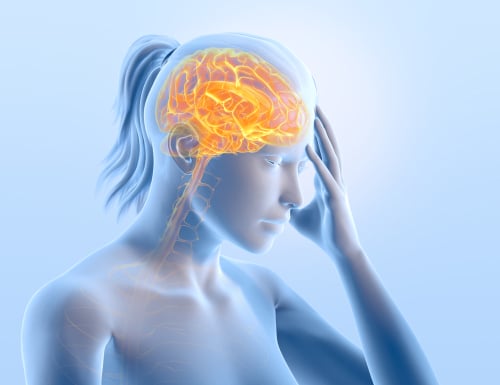Cluster headache is a neurological disorder that involves recurrent severe headaches on one side of the head, usually occurring around the eye.
This type of headache occurs in groups or “clusters” several times a day during the cluster period, which can last from several weeks to up to 3 months, or even longer.
Cluster headaches can also disappear for months or years, only to come back later. Dealing with repeated cluster headaches can severely disrupt your daily life and lead to stress and depression.
If you suffer from cluster headaches, it is essential to contact your doctor to discuss your symptoms and treatment options.
What are the symptoms of a cluster headache?
The main symptom of cluster headaches is intense sharp or burning pain occurring on one side of your head. Also, the pain spreads from the temple and eye.
During a cluster headache, the affected eye can become red, watery, or puffy. Moreover, the eyelid may droop, and you may have a runny or stuffy nose on the affected side of your head.
The headache pain reaches its maximum intensity quickly, within 5-10 minutes of headache onset, and the headache itself is relatively short, lasting for 15 minutes or longer. Although cluster headaches can happen any time, they usually strike at the same time of the day.
Cluster headaches can wake persons from sleep 1-2 hours after they went to bed, with nocturnal attacks often being more severe than daytime ones.
Other common signs and symptoms of cluster headaches include the following:
 Restlessness
Restlessness- One-sided pain
- Sweating of the forehead and face on the affected side
- Pale skin (pallor) or flushing of the face
- Eye redness on the affected side
What is a cluster period?
A cluster period is a time during which cluster headaches occur that typically lasts for several weeks to months. This period is often seasonal, recurring at the same time each year, with consistent duration.
Cluster periods can last for weeks or months and are usually followed by a symptom-free remission period, which can last up to one year. However, during the cluster period, headache attacks occur every day, and sometimes, several times a day.
What are the causes of cluster headache?
The exact causes of cluster headache are still unclear, with scientists always looking for factors which contribute to their development. Currently, it is thought that cluster headaches are caused by swelling of blood vessels in the head.
In addition, it is known that cluster headaches run in families, but their specific genetic causes have not been identified yet. Some research shows that cluster headaches are linked to the hypothalamus, a brain region which is responsible for maintaining the body’s biological clock.
Unlike migraines, cluster headaches are not associated with specific headache triggers. However, once the cluster period begins, drinking alcohol, smoking, strong odours, or certain medication can trigger the onset of a cluster headache.
What are the risk factors for cluster headaches?
The risk factors which increase your likelihood of developing cluster headaches include the following:
Age: This condition often develops in individuals aged between 20 and 40 years, although it can start at any age.
Sex: Men are more likely to develop cluster headaches than women.
Family history of cluster headaches: Individuals who have a first-degree relative with cluster headaches are more likely to develop them too.
Smoking: People who smoke have an increased risk of developing cluster headaches.
Alcohol consumption: Alcohol use is linked to cluster headache onset during the cluster period.
Sleep apnea: Cluster headaches are more common in individuals who suffer from sleep apnea.
How are cluster headaches treated?
Over-the-counter pain medication, such as aspirin, ibuprofen and acetaminophen are usually ineffective in treating cluster headaches. Because cluster headaches have a rapid onset and a short duration, they require acute treatment and fast-acting medications.
The following treatment options can be used to treat cluster headaches:
Oxygen therapy
During the cluster headache, inhaling oxygen through a mask can provide quick relief from the pain. For this treatment option, you will need to have an oxygen cylinder and regulator in your vicinity during your cluster period.
Local anesthetics
To achieve pain relief, local anesthetics such as lidocaine can be taken through the nose as a nasal spray to treat cluster headache pain effectively.
Triptans
This class of medication can also be used to treat migraine pain. However, since cluster headache pain onset is sudden, while its duration is relatively brief, the injectable form of this medication can be administered to treat cluster headache pain.
Dihydroergotamine
The injectable medication can also be used to achieve pain relief from cluster headache.
Octreotide
This medication is the synthetic version of the brain hormone somatostatin and can be administered by injection as a treatment for cluster headache pain.
How can cluster headaches be prevented?
Once a cluster period starts, you can eliminate some potential triggers to avoid headaches, which include:
- Smoking
- Drinking alcohol
- Nitrates (preservatives found in smoked and cured meats)
- Seasonal allergies
- Increased body temperature
- Sleep disruptions
- Stress
In addition, there are some medications you can take at the onset of the cluster period to suppress additional headaches.
These include the following:
Nerve block
This procedure involves injecting a mix of an anesthetic (pain-relieving) and corticosteroid (anti-inflammatory) medication into the region at the back of the head. A nerve block blocks the transmission of pain signals from the nerve, effectively treating headache pain.
Calcium channel blockers
This class of medications is often used for preventing cluster headache and is often used over the long term and in combination with other therapies.
Corticosteroids
These anti-inflammatory drugs can be effective in preventing cluster headaches and are typically used over the short term due to their potential side effects.
Conclusion
At the HMC Centre, we understand how intense and debilitating pain from cluster headaches can be. We specialize in non-narcotic pain treatment and use a comprehensive approach designed according to each patient’s needs.
If you suffer from cluster headaches, you can contact us to discuss your symptoms and treatment options, and to determine a treatment plan that works best for you.

